
Although the Maine Coon breed is a relatively healthy breed, they are prone to certain genetic diseases. Unfortunately, too many breeders out there choose to breed irresponsibly and not do any DNA testing on their breeding cats to find out if they are carriers of these diseases. I am going to highlight the main conditions that Maine Coons are prone to so you can understand why there is value in seeking out breeders who DNA test their breeding cats and produce kittens responsibly.
Hypertrophic Cardiomyopathy - HCM
Hypertrophic Cardiomyopathy is the most common cardiac disease in cats. Affected cats are at risk of sudden cardiac death due to defects that produce increased left ventricular heart muscle thickness. In the Maine Coon breed, the A31P mutation in the cardiac myosin binding protein C gene (MYBPC3) has been found to be associated with increased risk for HCM.
The A31P breed specific mutation for inherited HCM in Maine Coon cats produces moderate to severe cardiac disease which can lead to sudden death by age 4 years or less for cats that carry two copies of the mutation (homozygotes). Cats that carry one copy of the mutation (heterozygotes) have a longer life expectancy, but may still develop HCM. The mutation is a single base pair change in MYBPC3 that disrupts the production of the cardiac myosin binding protein C needed for normal heart muscle development.
Source: https://www.vgl.ucdavis.edu/services/cat/MaineCoonHCM.php
The A31P breed specific mutation for inherited HCM in Maine Coon cats produces moderate to severe cardiac disease which can lead to sudden death by age 4 years or less for cats that carry two copies of the mutation (homozygotes). Cats that carry one copy of the mutation (heterozygotes) have a longer life expectancy, but may still develop HCM. The mutation is a single base pair change in MYBPC3 that disrupts the production of the cardiac myosin binding protein C needed for normal heart muscle development.
Source: https://www.vgl.ucdavis.edu/services/cat/MaineCoonHCM.php
Spinal Muscular Atrophy Maine Coon Type - SMA
Spinal muscular atrophy Maine Coon type is a genetic disorder of Maine Coon cats. It is a neurodegenerative disorder caused by death of spinal cord neurons that activate skeletal muscles of the trunk and limbs. Loss of neurons in the first few months of life leads to muscle weakness and atrophy that first becomes apparent at 3-4 months of age. Affected kittens develop an odd gait with a sway of the hindquarters, are usually too weak to jump and stand with the hocks nearly touching. By 5-6 months of age, severe weakness in the hindquarters is apparent and muscle mass is reduced. Affected cats are not in pain and most live very comfortably as indoor cats for many years.
Source: http://www.animalabs.com/shop/cats/spinal-muscular-atrophy-maine-coon-type/
Source: http://www.animalabs.com/shop/cats/spinal-muscular-atrophy-maine-coon-type/
Erythrocyte Pyruvate Kinase Deficiency - PKdef
Erythrocyte Pyruvate Kinase Deficiency (PK Deficiency) is an inherited hemolytic anemia caused by insufficient activity of this regulatory enzyme which results in instability and loss of red blood cells. The anemia is intermittent, the age of onset is variable and clinical signs are also variable. Symptoms of this anemia can include: severe lethargy, weakness, weight loss, jaundice, and abdominal enlargement. This condition is inherited as an autosomal recessive.
Source: https://www.vgl.ucdavis.edu/services/pkdeficiency.php
Source: https://www.vgl.ucdavis.edu/services/pkdeficiency.php
